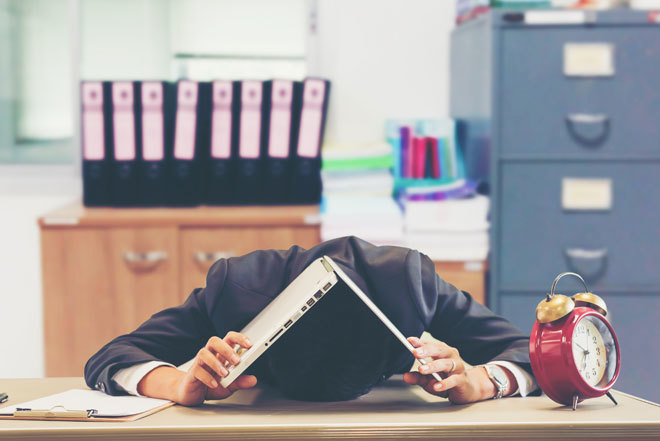WHO includes for the first time the burn-out syndrome in its list of diseases
So it kills you to change the schedule on weekends
My boss is a fool and he doesn't know, what do I do?
Summer is coming to an end, and with it also holidays, relaxing and stress-free days ... And difficulties arise to face the reality of everyday life again. It is at that moment when the return to the job is done uphill and the feeling of tiredness, sadness, apathy, nostalgia and lack of concentration floods us. Those in this situation are likely to be suffering from the well-known post-vacation syndrome , also called post-vacation stress or depression.
Although it is not considered a disease by the World Health Organization and in the scientific community there is no consensus on the definition and terminology used or the actual existence of this "syndrome", this symptomatology is related to the difficulty of adaptation of some people in the time to return to your work routine after a period of more or less prolonged disconnection.
" It is not a pathology but an adaptive disorder . Really, post-vacation depression does not exist. Depression is a serious mental illness that requires specialized treatment and attention. We would be banalizing this pathology, it would be enough if we used that term," explains Helena. Thomas Currás, Professor of Social Psychology at the Rey Juan Carlos University in Madrid.
The return to work after the holidays implies in many cases changes of schedules, return to obligations and responsibilities and in general leave behind a few days without ties, fun and without pressure. " We return to the routine of alarm clocks and fixed schedules , to be for long hours in front of the computer or facing the public, etc. It is the nostalgia of the holidays that causes a general malaise because it implies returning home and in many cases we have been very Well, back to this reality we don't always like, "says Thomas.
Although for most people this return to "normality" is not complicated, for others it is a real picture of stress: sadness, nostalgia, apathy, irritability, moodiness, lack of energy and concentration, boredom, demotivation, decrease of performance and even sleep and eating disorders, etc. They are usually some of the symptoms that characterize this adaptation process.
However, says the specialist, that these feelings do not usually extend beyond two, three or four days and disappear by themselves. While "if they extend, one would have to think that it is possible that there is some other fundamental problem that is affecting us and in which case it would be advisable to consult with a specialist," he suggests.
Although anyone can present this adaptive disorder, the most likely workers are those who have less tolerance for frustration, those who enjoy long vacations (one month) and those who return to a hostile work environment (rigid schedules, server bosses or uncompromising ...).
"There are situations that can generate it more easily and may even be accompanied by more serious problems. It is common in people who are not satisfied with their work or are subject to psychosocial risks - burnout or burn worker syndrome according to WHO, as a result of Chronic work stress that is the result of a state of emotional exhaustion - and, of course, those who suffer from moving at work, "says the expert, who emphasizes that" if a person has a job that motivates him, he will not have much trouble returning although on vacation we are all much better. "
HOW CAN I FIGHT IT?
To avoid or reduce the feeling of grief or sadness, the psychologist recommends following a series of guidelines :
- Get calmly. One of the biggest mistakes is trying to rejoin suddenly. To do this, return a few days before and acclimatize to the new situation. This will allow you to prepare physically and mentally to start working. It is not a matter of catching up with the house in terms of washing machines and cleaning or making the purchase, etc. but to have control of schedules, routine, tranquility ... Although we all want to make the most of our vacations we must try to avoid going practically on the first day of work with the suitcases in which case the impact of the change could be very abrupt.
- Maintain a realistic attitude. If we apply strategies to soften it and try to manage our emotions through questions or statements such as "what can happen to me?", "How can I be better?", "The days are still long and I can make many plans" we will better accept the he came back. After all, it is an adaptation process.
- Sleep at least eight hours. Being rested helps eliminate irritability and better cope with any situation that creates stress. It is also important to regularize sleep schedules to reduce the symptoms of the adaptation process.
- Recreational activities. It is true that you have returned to work and routines but the good weather and the days with light still accompany. Incorporate leisure activities into your routine so that the return is more relaxed. Walking, meeting with family or friends or even going to the gym can make you feel better.
- Do exercise. Sport is as good for physical as for mental health and you will get rid of stress.
- Promote the positive. Despite how bad the day may have been, there is always something positive. Finding the positive side to work will also allow you to observe the good things around you. In addition, there will be less left for the next vacation.
- Avoid negative thoughts. If we always return to that bad recurring thought, the feeling of anguish will increase more and more. Try to relax and disconnect with some activity you like.
According to the criteria of
Know more
Comments
This news has no comments yet
Be the first in give your opinion
0 comments
